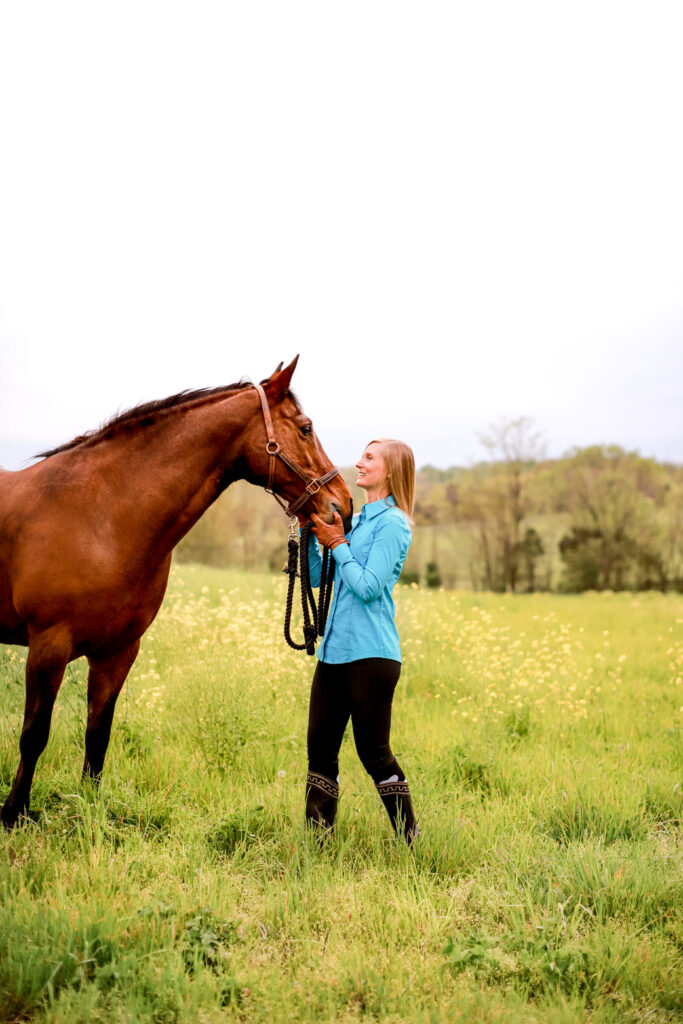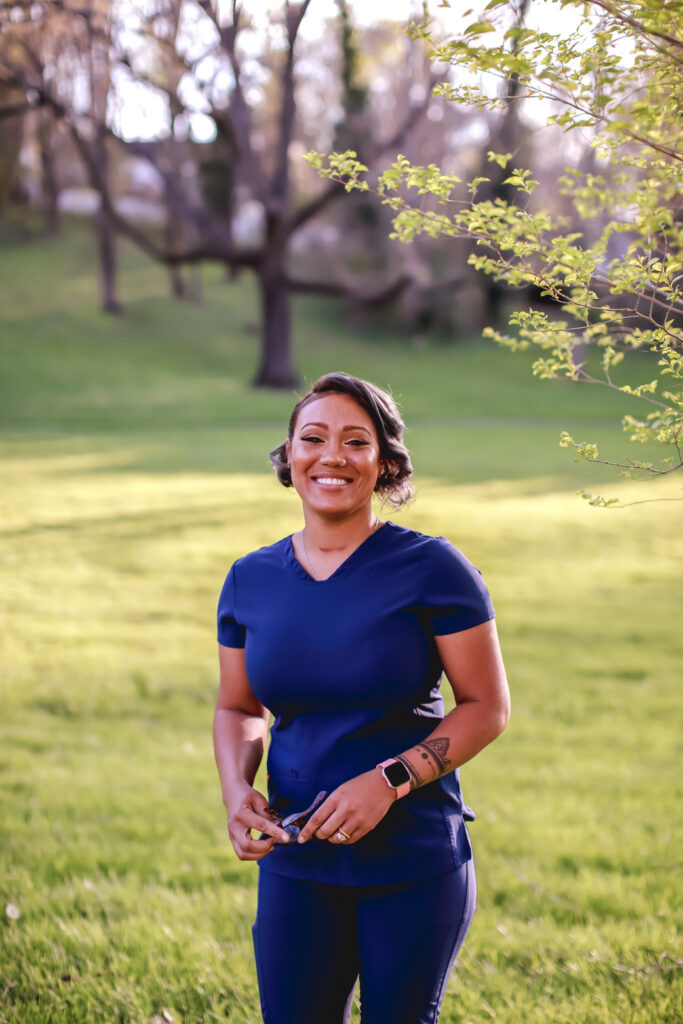Sacrifices and Silver Linings: Local Nurses Tell Their Stories

Story by Kaitlin Hill | Photographs by Jennifer Gray
As cases of the global pandemic COVID-19 spread nationally, so do fear and frustration. Separation from friends and family, food insecurity, unemployment, and worry for sick loved ones are a few concerns that weigh heavily on us. And with life so limited, many Americans wonder what more we will have to sacrifice, and where we can find silver linings.
Frontline workers Evie Sillex, a healthcare professional in Fauquier County, and Brianne Casey, an emergency department nurse in Aldie, share stories of how COVID-19 has impacted their lives.
One of the biggest challenges Sillex and Casey face shouldn’t come as a surprise to readers. “Everything you see on the news about the PPE [personal protective equipment] shortage is real,” Casey explains, “The goal is to use as few masks as possible because there are limited resources.” Nationwide, a lack of PPE has been one of the most difficult hurdles for healthcare workers to face when fighting this pandemic.
“We are trying to help the patients, but we don’t have the proper equipment to be able to do our jobs without putting ourselves at risk,” says Sillex. Lack of testing and delayed results are also concerning and make identifying and containing the disease a complicated task. Casey shares, “Not everyone can get tested for the virus because there is a shortage of tests.”

Brianne Casey
Even for those who can get testing, results are sometimes delayed, presenting its own set of problems. Sillex says, “Now with overload at the labs, sometimes it is taking a week to get results. That’s another problem because if someone comes in [contact] with a family member, that family member will have to self-isolate or quarantine until we get the results back or they start showing symptoms. Sometimes, the family member [that accompanied the patient] ends up coming back to the hospital, and we have to isolate them until their test results are back.”
The cycle of symptoms, results, isolation, and treatment leaves the nurses, doctors, and hospital staff working overtime and risking their lives to break it.
“We are having to pull 12 to 16-hour shifts because there is just an overload of people coming in. You are stressed and overwhelmed that you don’t have enough manpower for some of the overload of people coming in and needing help,” Sillex notes.
And though risk and long hours can be routine for healthcare personnel, the communicability of COVID-19 has healthcare workers keeping their distance from their families and friends. Many healthcare workers fear they are disease carriers and self-quarantine, adding loneliness to the list of daily stressors they already juggle. Casey confides, “One struggle that I am having is that I feel I have a high potential to be patient zero…I’m very close with my family, so I worry about them. I haven’t seen my parents or hugged my mom since this whole thing started and that’s very hard.”
For Sillex, it’s her kids that she worries about most. She confesses, “It’s hard for them to cope with this. They’re old enough to know what’s going on…You don’t want your kids in a situation where they could possibly end up with this virus that we don’t have a cure for.”
For all who have to isolate, it can take its toll, mentally and physically. Casey says, “It’s very lonely, and what I see happening is people come in that are having chest pain and shortness of breath that think they have it [COVID-19]. But a lot of the time it’s not. It’s anxiety because wandering around and only talking to your cat is difficult because people are social animals.”
Despite the long hours, distance from family, fear of infection, and lack of equipment, Sillex and Casey believe most of their challenges have silver linings.
Casey hopes the disastrous shortages in PPE will inspire improvement for the future and a renewed focus on sustainability. “I am looking at this terrible thing as an excellent catalyst to encourage us to think outside the box and continue to improve,” she says. “And resources should not be taken for granted, that is a lesson worth learning.”
She has also seen her community meet the needs of healthcare workers. From temporarily closed dentist offices donating their unused masks, to local restaurants feeding the frontlines, she says, “Everybody has been super supportive. It’s an amazing community. I have not had to buy food in weeks because all of the restaurants in the area…just send food over to the hospital.”

Evie Sillex
Sillex has felt the love from her neighbors too. “We have tremendous support in the community for all our medical personnel,” she says, “Churches and community centers are donating gift baskets. We had one church that made a bunch of cloth masks for us. We had one teacher and a bunch of students make a video card for us, telling us they really appreciated us and to keep up the good work.”
She adds, “Some people might see it as something small, but to us just knowing that somebody cares…means so much to us. And we are just happy that they are healthy and home safe.”
Casey notes that support is also found within the walls of the hospitals, and that a silver lining of this pandemic might be an increased focus on mental health. She shares, “You can get PTSD working in the ER, even under normal circumstances. The company that I work for has always had resources, and you just have to reach out. Now, with this at the forefront of everyone’s mind, they send out a reminder that we all have access to help.” Though even more, she appreciates the sense of camaraderie within the team she works for and the support they give to one another. “The team that I work for is truly family. It has been amazing to work with them…. It’s a really tight-knit group of people that are always there to help.”
A final thought Casey shared is her belief that this pandemic will spur a cultural change. “Today everybody is a workaholic. You get up and it is go, go, go. And now, all of a sudden, everybody has a mandatory stay at home order. With people staying home, they remember to enjoy each other’s company. They are getting to know their babies and spend[ing] quality time with their spouses. It is a time for slowing down and self-reflection, even with an unfortunate background.” For Casey, that is time spent riding her horse and even mowing her lawn.
For the rest of us, perhaps part of that self-reflection is an increased appreciation for people like Casey and Sillex, and an enduring consideration for one another. Sillex shares, “In the healthcare community we are doing everything we can to the best of our ability with what we have. And we just want you all to know that we’re always going to be here to keep everyone safe. It doesn’t matter who they are.”As Casey and Sillex work to keep us safe, the least we can do is follow their example by making sacrifices to benefit the greater good, showing compassion for those in need, and being grateful for all we have. As Sillex puts it, “At the end of the day, we all need to try to support each other and keep each other safe. If we can do that, I think we can get through anything.” ML
This article first appeared in the May 2020 issue of Middleburg Life.


